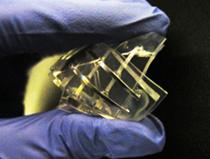Soft memory device opens door to new biocompatible electronics
15 Jul 2011
Researchers from North Carolina State University have developed a memory device that is soft and functions well in wet environments – opening the door to a new generation of biocompatible electronic devices.
 |
| Researchers have created a memory device with the physical properties of Jell-O, and that functions well in wet environments. |
''We've created a memory device with the physical properties of Jell-O,'' says Dr. Michael Dickey, an assistant professor of chemical and biomolecular engineering at NC State and co-author of a paper describing the research.
Conventional electronics are typically made of rigid, brittle materials and don't function well in a wet environment. ''Our memory device is soft and pliable, and functions extremely well in wet environments – similar to the human brain,'' Dickey says.
Prototypes of the device have not yet been optimised to hold significant amounts of memory, but work well in environments that would be hostile to traditional electronics. The devices are made using a liquid alloy of gallium and indium metals set into water-based gels, similar to gels used in biological research.
The device's ability to function in wet environments, and the biocompatibility of the gels, mean that this technology holds promise for interfacing electronics with biological systems – such as cells, enzymes or tissue. ''These properties may be used for biological sensors or for medical monitoring,'' Dickey says.


















